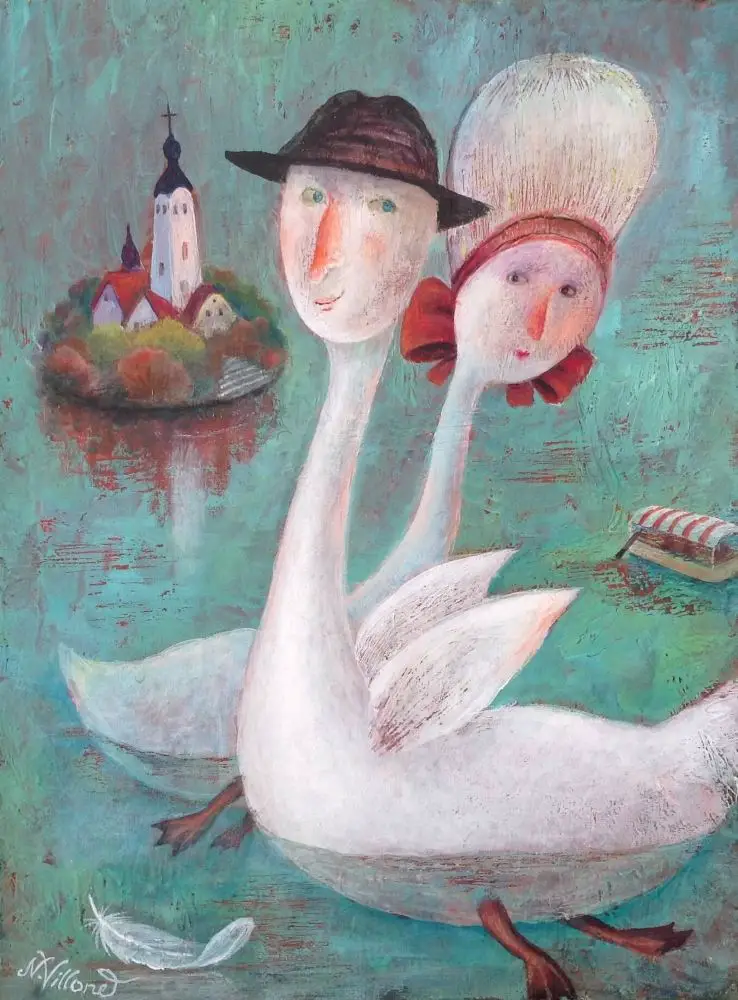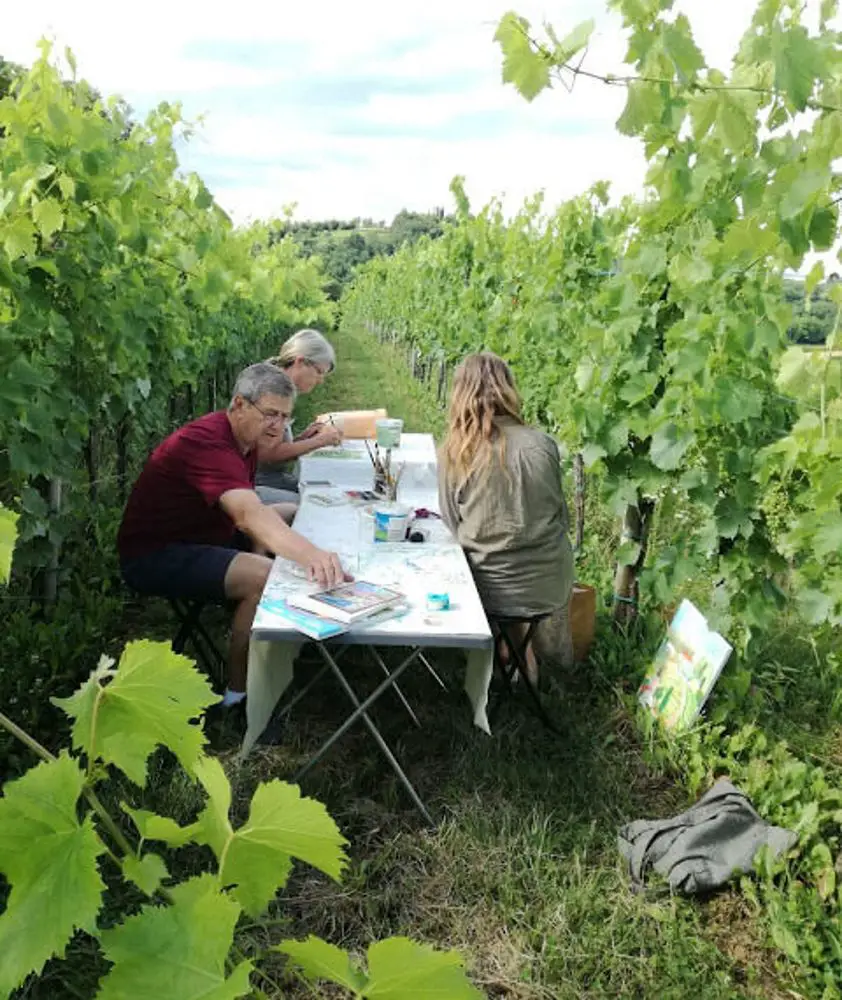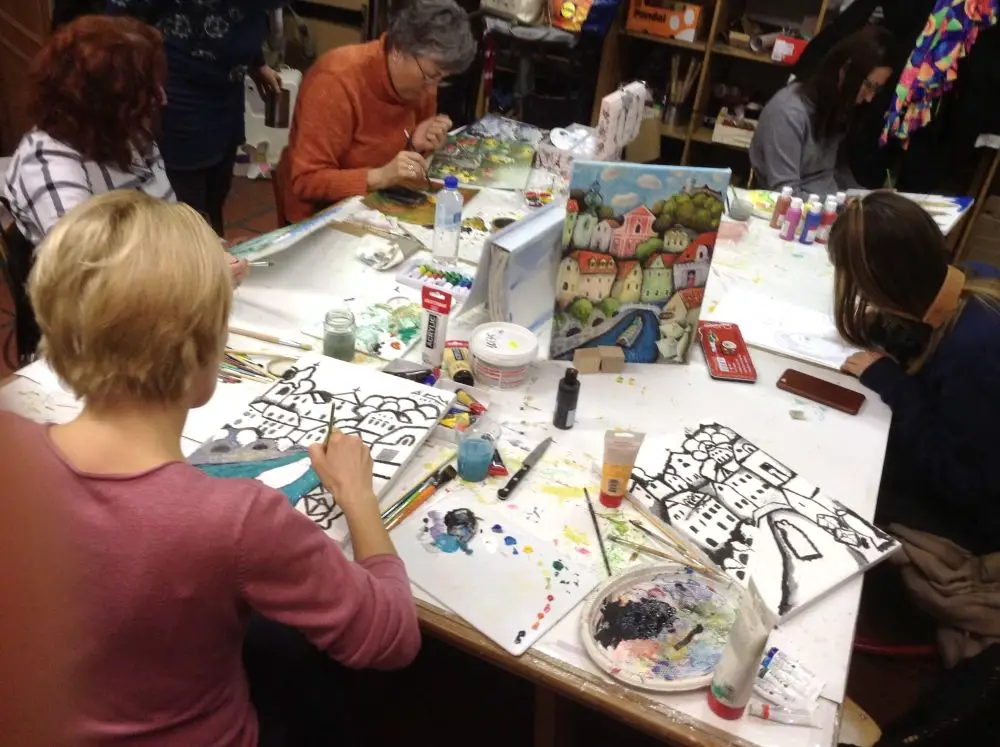Ljubljana related
STA, 22 February 2019 - Port operator Luka Koper posted a group net profit of EUR 60m last year, an increase of 71% compared to the year before, as net revenue rose by 7% to EUR 226m on a record volume of transshipment.
Operating profit (EBIT) was up 90% to EUR 70m. Discounting one-off compensation payment of EUR 9.6m accounted for in 2017 revenue and provisions for legal liabilities of EUR 15.7m accounted for in 2017 expense, EBIT was up by 15% in real terms, the company announced via the Ljubljana Stock Exchange.
Without taking into consideration the compensation received and the provisions, net profit increased by 9% in real terms in 2018.
The port transshipped a record 24 million tonnes of cargo in 2018, up 3% from the year before. Container throughput was up by 8% to 988,000 TEUs and car throughput rose by 2% to 754,000 vehicles.
The port's cruise terminal recorded 101,415 passengers, a rise of 41% from 2017.
Capital expenditure decreased by 56% to EUR 16m, while the number of the group's employees increased by 12% to 1,242.
STA, 15 February 2019 - The European Investment Bank (EIB) has placed the project to build a new railway line between the port of Koper and Divača among the projects it would finance with loans. The state-owned company managing the project said that the EIB would provide a EUR 250m loan.
Announcing the news, 2TDK said that it had submitted the application for a EUR 250m loan to the bank last May.
"Negotiations between the EIB and 2TDK followed between October and January, on whose basis the investment bank will make a final assessment of the project and expectedly send it for confirmation by the board of governors in April."
Infrastructure Minister Alenka Bratušek, whose ministry is responsible for the project, welcomed the news, saying that the bank had recognised the quality and importance of the project.
"I'm happy that the things are moving in the right direction," the ministry quoted Bratušek, who added that the lengthy negotiations with the EIB had obviously produced a positive result.
"The decision is not final yet, but the placement on the EIB list means that the bank too has recognised the quality and importance of this project, which I believed in and expected throughout," the minister added.
In addition to government funding, the investment plan for the project also envisages loans from international financial institutions and the state-owned SID export and development bank, EU grants and loans from commercial banks.
The plan values the project at EUR 968m at current prices, but together with a reserve for unexpected works and interest the total price tag will be EUR 1.2bn.
All our stories on railways in Slovenia can be found here
The railway will be only 27 kilometres long, but the huge cost is attributed to the high number of tunnels and bridges on the tricky karst terrain.
Good news for the project also came today from the National Review Commission, which rejected a request for the suspension of public contracting pending an audit of the public tender for the project dossier.
The audit and the suspension of the public tender process was demanded by the engineering company Geoportal at the end of last year.
The review commission is yet to decide Geoportal's request to annul the tender. 2TDK had already rejected the request before forwarding it to the National Review Commission.
The sole bid for the job, worth EUR 19.93m excluding VAT, was submitted by a consortium of companies consisting of Elea iC, SŽ-Projektivno Podjetje and IRGO Consulting.
STA, 7 February 2018 - The Administrative Court has turned down an appeal by Boris Popovič, the former mayor of Koper, who challenged his narrow loss against Aleš Bržan in the last local election. The court found some violations in the election but said Popovič had failed to submit sufficient evidence that they affected the outcome of the election.
"We will study the ruling in detail and then take any further decisions," Popovič's lawyer Franci Matoz told the STA today.
The court made the decision without the main hearing, although Popovič had proposed it.
The 28-page decision is based on evidence which had already been presented to the municipal election commission and the municipal council, the court said, adding that no "new facts or evidence" had been submitted in the appeal.
Popovič, who narrowly lost the mayoral race, lodged the appeal with the Administrative Court on 10 January to challenge the results of the 2 December run-off that he lost by just 17 votes out of almost 28,000 cast.
Formally, the appeal referred to the decision of the Koper city council that verified the result of what was arguably the biggest surprise of the local elections on 21 December last year.
In his appeal, Popovič alleged violations of the election blackout, irregularities in mail-in voting, and claimed that the municipal electoral commission had overstepped its powers. He demanded a recount.
The court cleared the electoral commission's decision regarding invalid ballots and added that a recount was not envisaged by law. It also found no irregularities in mail-in voting.
However, it agreed that a constitutional right of one voter had been violated - a disabled person who cast their ballot in the early voting - but said this did not affect the outcome of the election.
The court's decision is final. Popovič could still turn to the Constitutional Court but the former mayor told reporters on Wednesday he would respect the court's decision.
The new mayor, Bržan, told the press today he had expected such a decision and was looking forward to being able to finally start working without distractions.
"The team that had been on standby so far is ready, the municipal budget is also largely ready and it's time for us to start implementing our programme," Bržan said.
A Slovenian team, working for the Piran-based organisation Morigenos, has discovered that the common bottlenose dolphins (Tursiops truncatus) living off the coast share the Bay of Trieste, dividing it based on time of day rather than territory, the first time such behaviour has been observed.
A paper published in the journal Marine Biology, “Behavioural and temporal partitioning of dolphin social groups in the northern Adriatic Sea”, and written by Tilen Genov, Tina Centrih, Polona Kotnjek, and Ana Hace, outlines how the researchers carried out their work, and what they learned. The team used the distinctive features on the dorsal fins of 38 dolphins to keep track of each individual, noting when and where the animals were sighted in the bay. An analysis of the data showed that the dolphins were divided into two groups of 19 and 13, with the remaining six making up a loose group of its own. The larger group of dolphins tended to following fishing trawlers between the hours of 07:00 and 3:00. In contrast, the smaller group of 13 were seen swimming with the trawlers, and hunted in the bay between 18:00 and 21:00. Dolphins from each group were rarely in the same area at the same time.
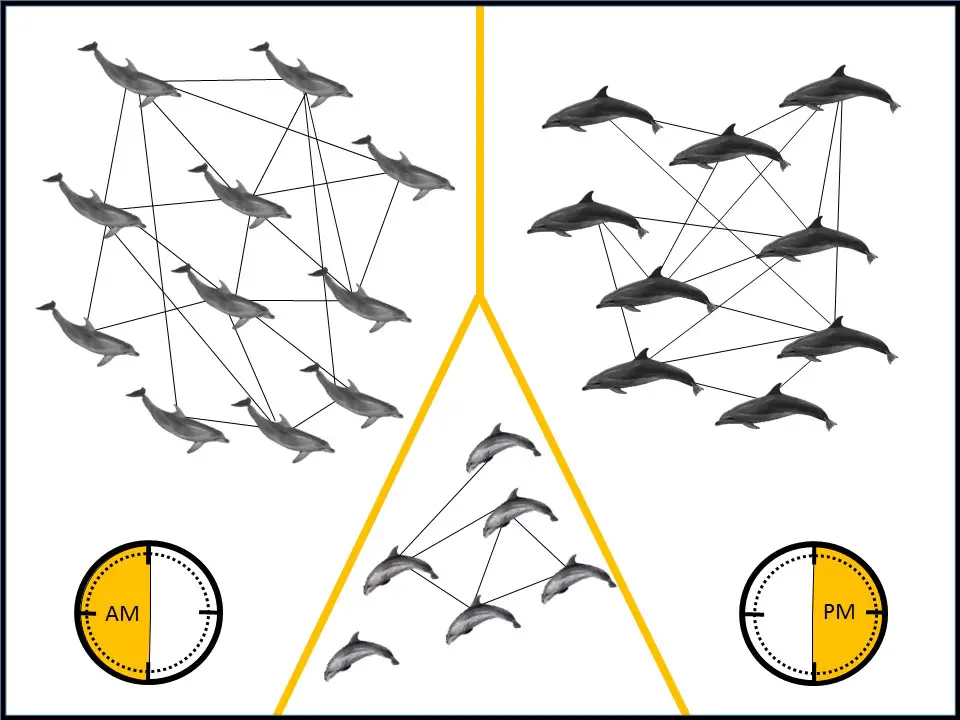
Source: Tilen Genov
In addition to revealing such temporal segregation for the first time in this species, the study is of interest because – as the paper concludes – “We demonstrate how different segments of the same population may behave very differently and have differing effects on human activities such as fishing (through potential depredation or gear damage). In turn, they may respond differently to anthropogenic pressures, as temporal partitioning may make animals either more or less vulnerable to disturbance from boat traffic.”
The full paper can be found here, while those interested in learning more about Morigenos can read an earlier story about the organisation here. The study reported in this story is also summarised in a short and relatively simple Slovene-English dual text here.
Moving to another country is often a difficult process, as you go through the stages of honeymoon, frustration, adjustment and acceptance, learning how to not just live but thrive in a new environment. Natasha Villone is someone who knows this well, having been born in Orel, Russia, and made new lives in the US and then Slovenia, where she’s now based in Koper and works as an artist – selling her works, teaching and leading art tours. We got in touch with her to learn more about her journey, and she was kind enough to send back some answers.
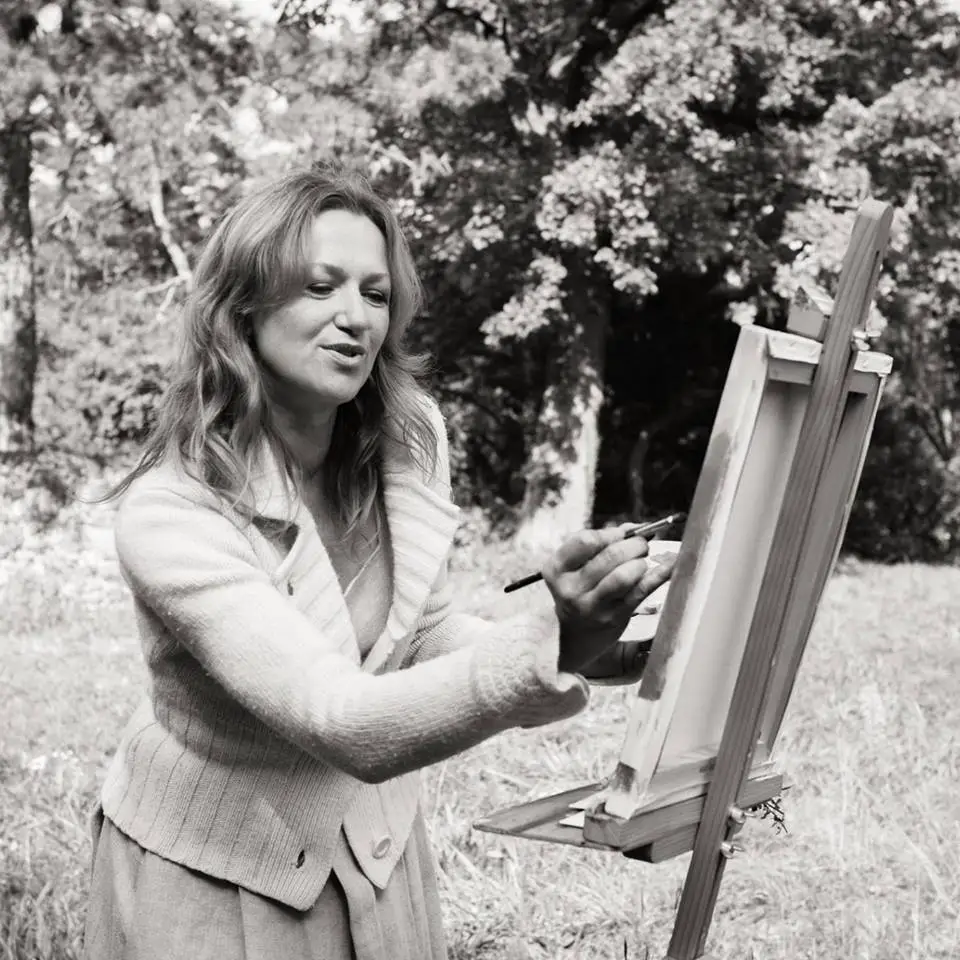
Natasha, painting
You work as a painter. When did you first get serious about art?
Since childhood the easiest and most natural thing for me to do was to paint. In spite of this, when I young, after high school, I wanted to run away from carrier as a painter. But my mom, a very wise woman, secretly signed me up for art collage, where I got diploma in theatre design.
Back then in Russia after me and my classmates graduated we were supposed to work by college referral in some type of village theatre or community club for a minimum of three years. I refused, and in order to stay in a city I took a job at the famous tray and samovar (Russian teapot) factory “Zostovo”. I painted traditional decorative trays with bouquets of roses. Later in my art life I’d use principals which I learned at the factory: volume, perspective, range of colours. But at the time the production line job and constant paint under my nails made me want to be somebody else.

Then the Soviet Union broke apart. Russia was under President Yeltsin everything went upside down with jobs, morality, values. The factory was closed and I was left with no direction. Maybe it gave me push to look for new life abroad.
In 2001 I finally moved to America, Seattle, hoping the grass was greener there. Then in the same year September 11 happened, followed by an economic crisis. I had to do many hard jobs, and wasn’t sure that I could paint again, so I changed direction and tried something different, not just to become an artist.
But ability and desire to create were still inside me. Once at church I heard the pastor say that it’s sin to bury your talent. There’s that story in the Bible about a servant who buries the talents (money) that his master gave him to make a profit on. He was afraid to use the money and so returned it without any gain, but the master wasn’t happy at all. It was this message that pushed me to start painting again.
I’m thankful to my husband Andrew, too, about this. Many times he would walk into galleries, meet the owner, talk about me, and I would have a show there. It’s very important if your spouse supports you, promotes you, or lets you know if you’re not producing enough art, or too much art, and not marketing it well. In this business being a good artist is just 10%, the other 90% is your character not giving up, and knowing how to present yourself to the public.
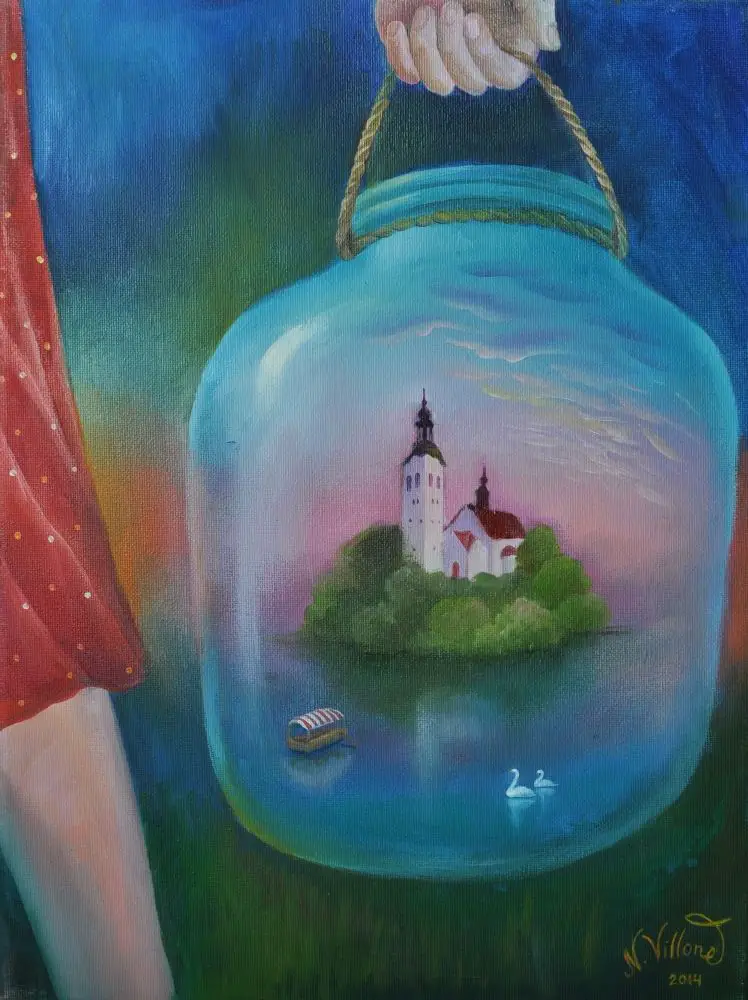
How did you end up in Slovenia?
While living in America, my husband started running a tourism business in Slovenia. Flying back and forth between the two countries was too hard. I remember one day he said: “Prepare yourself, you have one year, then we’ll move to Slovenia.”
By this time we had two little kids. I was working for good company. My mom from Russia was living nearby and helping with the kids. Art was my second freelance job sometimes in a evening. And now I have to quit my stable job, leave my mom, take kids and follow my husband. Women would not do it, only man could do such a crazy but maybe strategic decision . To be honest, I cried a lot saying goodbye to everything after 14 years establishing my life in America, hoping for some kind of change in our plans.
We finally did it in 2014, and things went smoothly, step by step. We even managed to get on the show “House Hunters International”. God thus made some fun for us, so we wouldn’t be sad just after cutting off our roots in Seattle. People where recognising us from that show for several years, even in Slovenia, so now we know what celebrities feel when they don’t want to be recognised.
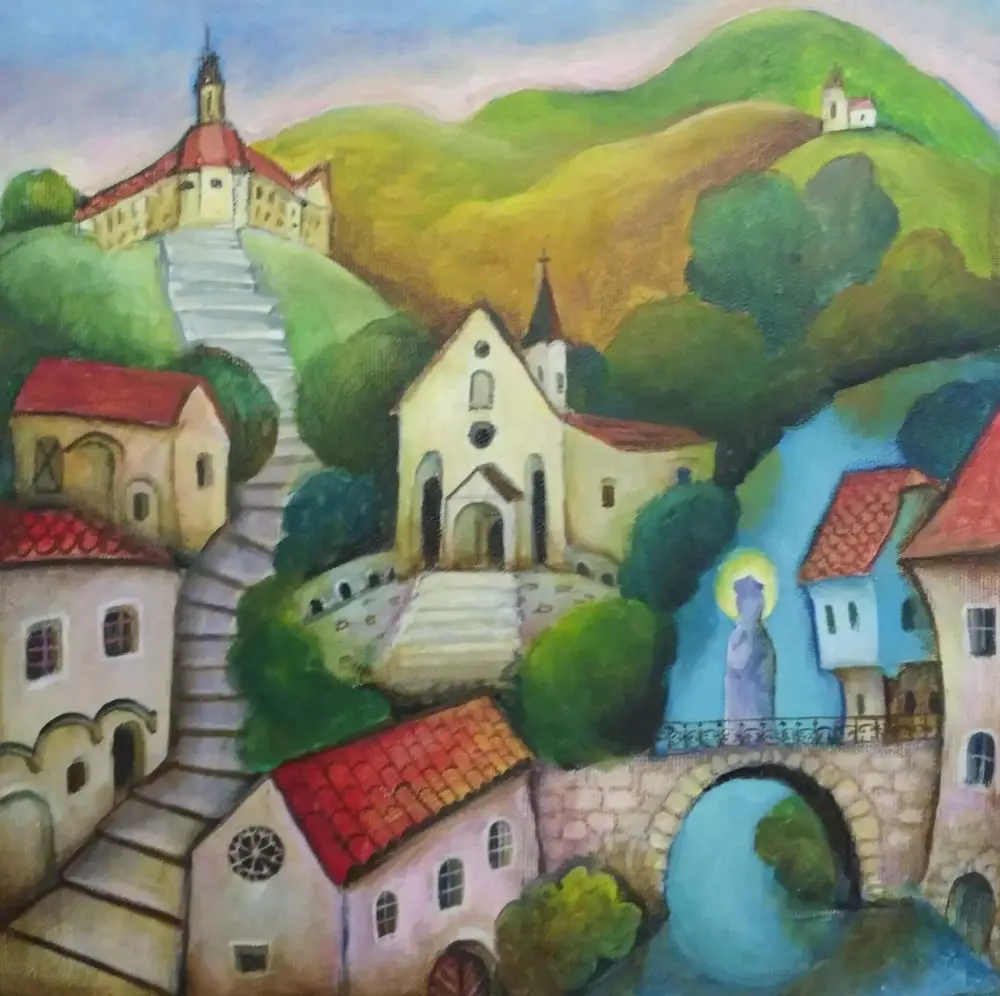
How did you make the move to art here?
In Slovenia I’m wasn’t looking for an office job, because of the language, so art became my priority. Living in Europe helped me travel more, exhibit and sell my art. In 2016 I won the grand prix in the biggest European festival of naïve art, held in Poland. Last year I published my first children’s book Repa velikanka (The Giant Turnip). Perhaps it’s little easier here than trying get lucky with a New York publisher
Unfortunately it’s hard to sell anything in Slovenia, especially art, unless it’s very cheap. But still I’m very thankful to be able to paint. I always tell my students in the adult classes I teach that when you create you never feel lonely or old, you will not be afraid to be left without job, or to retire. It’s like you’re hiding away in a magical world full of new adventures. Yes of course sometimes you struggle, sometimes your idea reveals itself through an image easily. You never know. My only complaint is that I don’t have enough hours in a day to find some extra time to paint among my routine of being housewife with two kids.
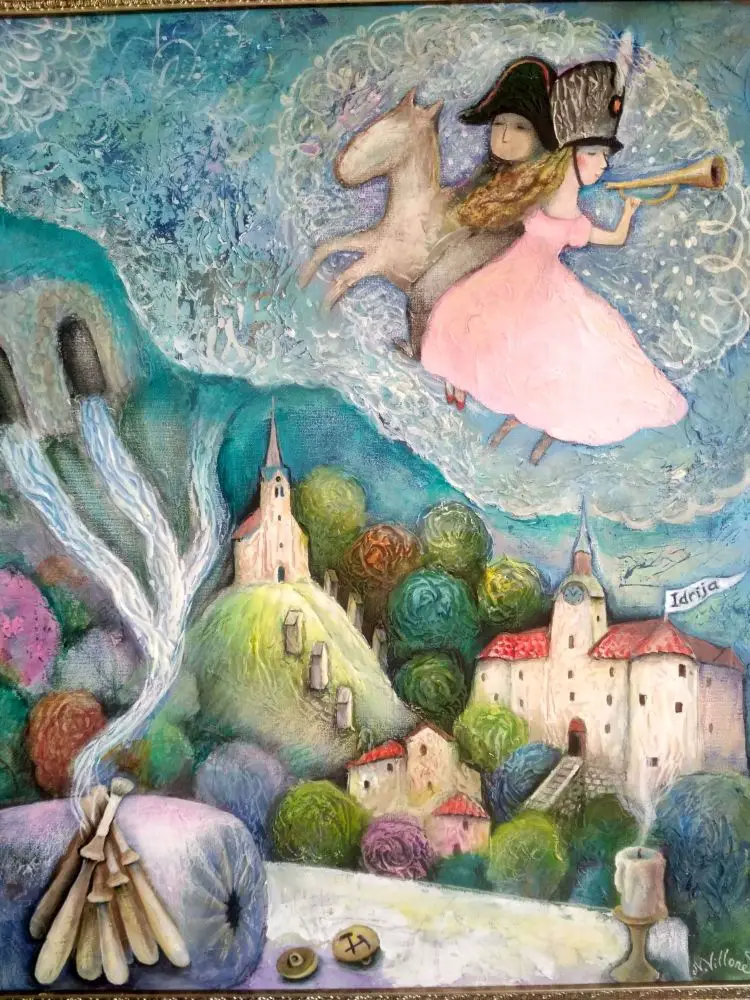
Tell us something about the art tours you run.
As I said earlier, my husband works in tourism, organising food tours of Slovenia, so we started running art tours together. It works perfect between us. He’s the organiser and driver, and then while I’m doing the workshops he’s taking a nap.
We do a seven-day art tour that’s suitable for everybody: from beginners to experienced painters. On the tour you learn a few painting techniques and some tricks from me, so you can create art which looks look deep, textural, and a little vintage.
We choose the most picturesque places to do workshops in the open air. So Lake Bled, the vineyards of Brda, and in Piran, on the Adriatic coast. On a tour we paint, hike, eat homemade food from the local farms, and learn the recipes in a cooking class. There’s also wine-tasting in vineyards, and trips to an olive garden and other farms. You can find out more at my website.
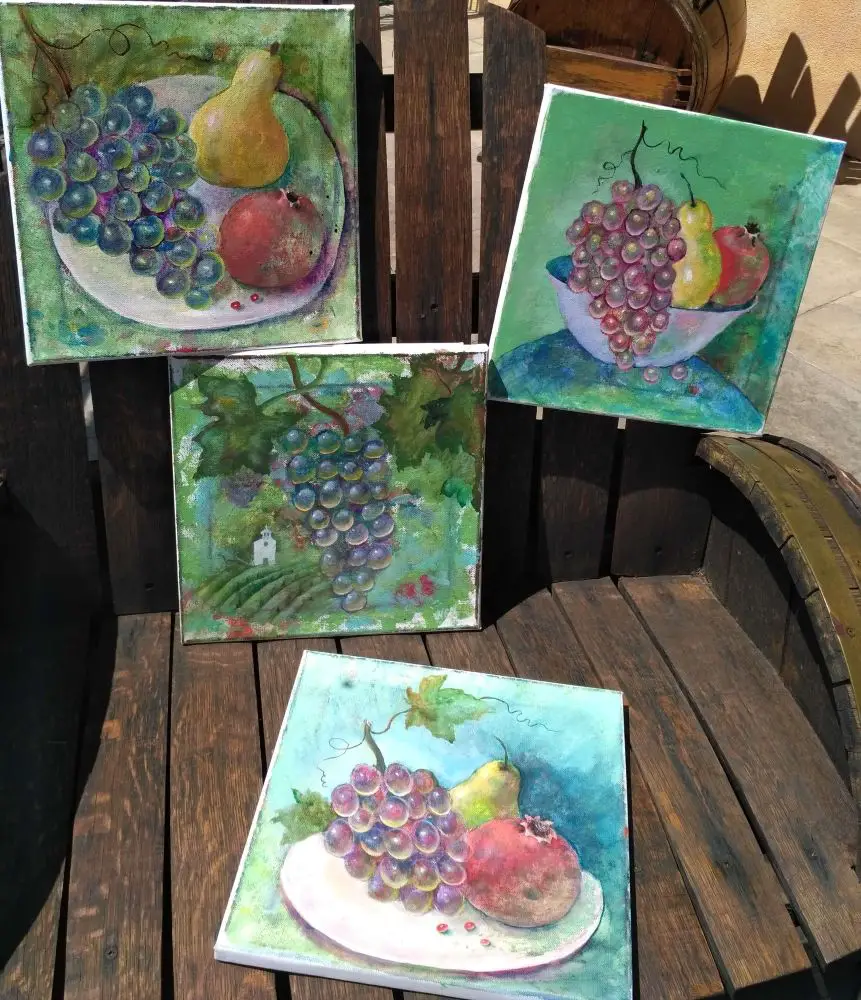
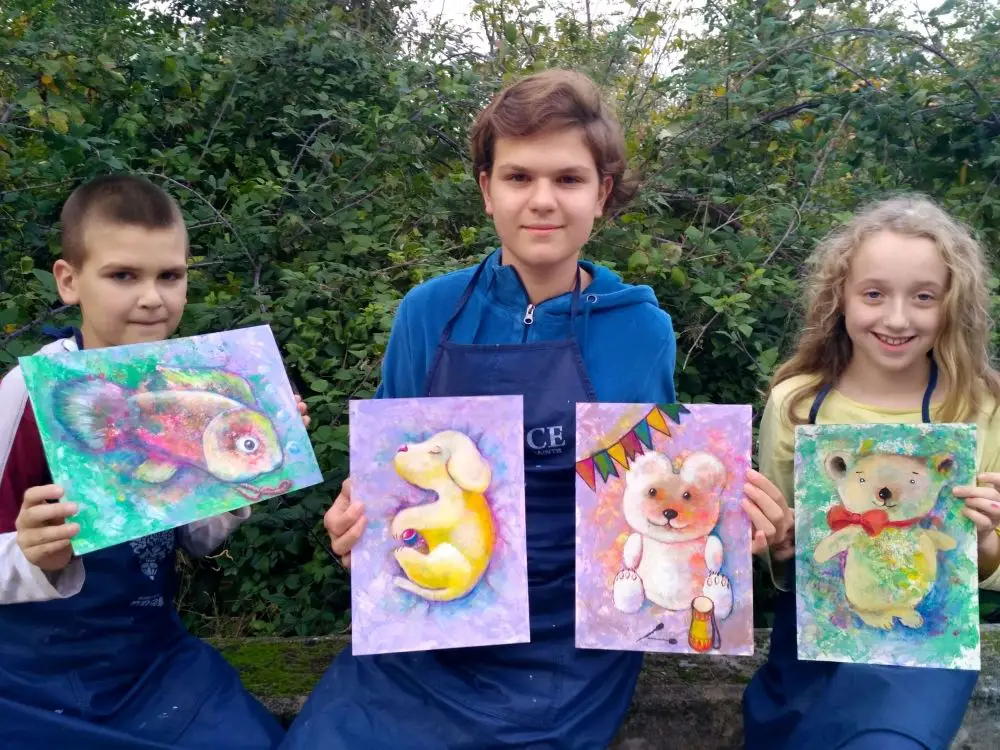
What are your plans for the future?
Nowadays we live in Koper. Watching the sea, boats and cruise ships cheers me up and gives me new ideas for paintings. My hope is to find place and start exhibiting my art in Slovenia this year, so I can invite your readers to a show. Now I’ve been here a few years I’ve painted lots of Slovenian places, like Bled, Ljubljana, Škofja Loka, Idrija and others. My style is what they call naïve. I see things figuratively, symbolically – combining reality with imagination.
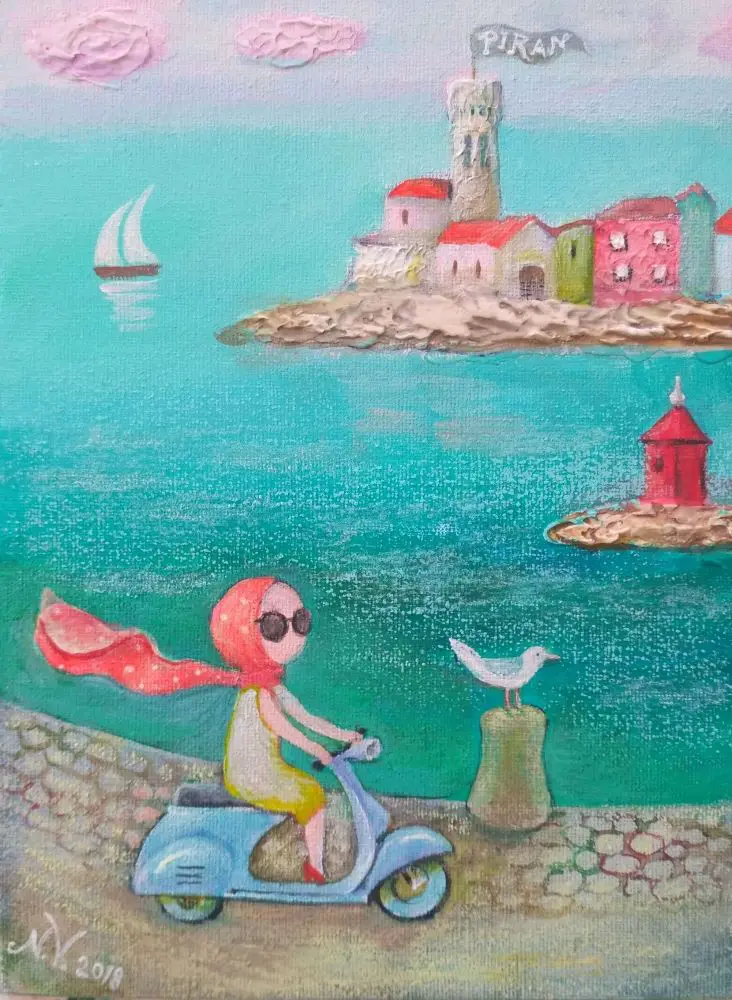
If you’d like to see more of Natasha Villone’s work or learn more about her tours then you can do so on her website, Facebook, or Etsy page, and if you’re in Koper you can sign up for one of her weekly workshops, which happen every Thursday, by sending an email to This email address is being protected from spambots. You need JavaScript enabled to view it.
And if you'd like to share your story with our readers, then please get in touch at This email address is being protected from spambots. You need JavaScript enabled to view it.
STA, 8 January 2019 - The Koper Science and Research Centre (Znanstveno-Raziskovalno Središče Koper) has won a EUR 2.8m project as part of the Horizon 2020 research and innovation programme to study and help overcome the obstacles to the integration of migrant children into European societies.
The three-year project will run until the end of 2021, the Koper centre said in a press release on Tuesday.
This is the first Horizon 2020 research project in the field of social sciences that will be led by a Slovenian centre, said the Koper centre, which was picked among 30 bidders from all over Europe.
The project entitled Migrant Children and Migrant Communities in the Changing Europe will study the inclusion of migrant children in the societies of European countries from the perspective of the child.
Based on field studies carried out in ten countries, recommendations for legislative changes and political measures will be made. Computer applications featuring tools aimed at improving the integration of children into the society will be developed for use in almost all EU countries.
Field research will be conducted in primary schools and high schools, migrant centres and asylum centres in Slovenia, Austria, Spain, the UK, Denmark, Poland, Italy, France, Greece and Turkey.
Researchers will develop various computer apps for teachers, migrant children and local children to promote multiculturalism and dialogue.
The Koper centre will cooperate on the project with three other Slovenian institutions - the Peace Institute, the Faculty of Computer and Information Sciences, and the Faculty of Design.
Tomos, Koper-based Motorcycle Maker, Enters Receivership
STA, 3 January 2019 - The Koper District Court sent famed motorcycle maker Tomos into receivership on Thursday after the Koper-based company failed to find a strategic partner to help it cope with liquidity issues.
The proposal for receivership was filed last November by Tomos employees after the company failed to pay their wages, contributions and the annual holiday allowance.
Since Tomos had neither contested being insolvent nor asked for a deferral, it is considered insolvent under the insolvency law.
"The court decided to send the debtor into receivership," says the court's decision, posted on the website of the Agency for Public Legal Records (AJPES).
The court appointed Štefan Veren the official receiver, giving creditors until 3 April to report their claims and secured debt.
When the workers filed for receivership, Tomos director and owner Iztok Pikl said the company could still be saved. However, he admitted it owed its employees two monthly salaries and the holiday allowance.
Pikl or his company MPO Kabel bought the manufacturer of motorcycles and scooters in 2015 from industrial conglomerate Hidria, which sold it as a non-strategic asset.
Hidria acquired Tomos in 1998, it briefly liquidated it in 2012 only to revive production later on.
Related: Koper-Based Moped Maker Seeking New Strategic Partner
STA, 29 December 2018 - Three years after house searches at three night clubs in Nova Gorica and Sežana, eight defendants were handed down prison sentences for coercing women into prostitution, the newspaper Primorske Novice reported on Saturday.
The sentences, pronounced by the Koper District Court on Friday, range from three and a half years in prison to suspended sentences, but are not final yet.
The court found the defendants guilty of abusing at least ten women, mostly from Ukraine, for prostitution, whereas the prosecution spoke of 70.
Iryna Uršič as ring leader was sentenced to three and a half years in prison, her aides Iryna Ahaponova and Maria Fedotova to two years and to 18 months in prison, respectively.
Uršič and Fedotova had been in detention until March 2017, when the trial started.
The other five defendants, of whom two men, received suspended sentences.
Uršič will also have to pay a fine of 8,850 euros and return almost 81,000 euros in illegal gain, whereas the company Euromega was fined almost 60,000 euros.
The defendants can lodge an appeal against the sentences, with Uršič announcing it even before the verdicts were delivered.
In May 2016, the Specialised Prosecution Office filed changes of human trafficking against 12 persons and two companies, but later changed them to the crime of abuse for the purpose of prostitution, dropping them against two suspects, while one died and one pleaded guilty.
Related: Report Finds Some Progress on Human Trafficking in Slovenia
STA, 3 December 2018 - The mayoral race in Koper was too close to call until all mail-in ballots were counted on Monday. The count confirmed Aleš Bržan, a radio host, managed to dethrone long-serving Mayor Boris Popovič, but by a mere seven votes.
Of the 46 mail-in votes, 45 were valid, commission chair Miloš Senčur told the press.
Twenty-five votes were for Popovič and 20 for Bržan, which means that according to unofficial results, Bržan received 13,921 votes and Popovič 13,914.
In his first statement after the mail-in votes were added to the tally, Bržan said "people have decided on change and the change is here, so all I can say is thanks to all those who have made an effort and to all who turned out to vote".
He did expect a narrow result, yet not that narrow. "Nobody expected such a narrow outcome. We expected a margin of several hundred votes."
Earlier in the day, Bržan said he would demand recount since last evening's count of the votes from early voting revealed some irregularities.
It was reported that there were 2,715 ballots from the early vote, but the number of ballots exceeded by six the number of people who were registered as having voted.
But this is according to Bržan not an option now. "For us, this story is over."
In a comment to a fierce race, Bržan said "both candidates should first calm down people and passions so that we can start living normally again".
Meanwhile, Senčur explained that the number of ballots and the number of people having voted in advance in fact matched. Of the 2,715 ballots, nine were invalid.
He explained, however, that complaints about the performance of the local electoral commission could be filed until midnight.
Asked whether it was still possible for the Koper vote to be annulled, he said: "Anything is possible if the complaint is justified."
The mayoral race in Koper provided one of the biggest surprises in this year's local elections.
Not only did Popovič lose after 16 years in office while he was set to win his fifth term in a landslide even two weeks ago, but also for Bržan, who, except on the coast, was until recently relatively unknown.
Securing 30.4% of the vote in the first round, Bržan trailed Popovič by 14 points, but was then endorsed by almost all the other mayoral candidates in Slovenia's fourth largest municipality.
Popovič, who conceded defeat already last evening, has run Koper in a rather authoritarian manner, which many locals got fed up with, apparently also Bržan, who announced to bring change to the style of leadership.
Bržan, born in Koper in 1976, is a logistics engineer, but he is best known as a host on a popular local commercial radio station.
The website of his Aleš Bržan List (LAB) party says that over the past decade, he has managed a small company.
While still a student, he overhauled the Koper students' club and revived the streets of Koper with a special project.
Not entirely a political novice, Bržan challenged Popovič before, in 2014, when he, with the support of the Modern Centre Party (SMC), emerged as the runner-up.
He later distanced himself from the SMC, the party of the former prime minister, Miro Cerar, and has spent most of the past four years as independent city councillor.
He founded his LAB party just before this year's local elections, but was not among the fiercest critics of Popovič. On the contrary, he credited his predecessor with a number of achievements.
Given that his party has won nine seats on the city council to emerge as the second strongest, it seems that such restrained rhetoric worked for both the party and him.
All our stories related to Koper can be found here
STA, 29 November 2018 - Slovenia has been fixated on Maribor and Koper as local elections enter the run-off on Sunday. Maribor will get a new mayor in any case and in Koper the incumbent faces the biggest challenge of his career. But there are plenty of other races that could produce surprises as well.
In Maribor, Slovenia's second largest city, former mayor Franc Kangler, the candidate of the right, and businessman Saša Arsenovič, an independent running on the Modern Centre Party (SMC) ticket, are neck-and-neck with just days to go until the polls open.
The latest poll by Večer, the Maribor-based daily, puts Arsenović less than two points ahead of Kangler, but the race is too close to call. In the first round, Arsenovič was well ahead, with 38.2% to Kangler's 31.4%.
While the campaign ahead of the second round shifted a gear lower from the tense and at times aggressive campaigning for the second round, the race is lively given that the candidates represent two very distinct visions of Maribor.
The more urban Arsenovič, a businessman credited with helping to revive the struggling centre of the city, looks up to the long-term mayor of Ljubljana, Zoran Janković, as he tries to infuse town hall with a bit of business acumen.
Kangler, a former police officer and MP who was ousted as mayor in 2012 in mass protests sparked by allegations of corruption, has a can-do attitude but connects better to Maribor's suburban and rural population with his populist, salt-of-the-earth rhetoric about returning the city to its industrial glory.
The race in Koper, the biggest city on the coast and home to Slovenia's sole seaport, pits incumbent Mayor Boris Popovič, who has run the city with a penchant for strong-arming for 16 years, against radio host Aleš Bržan.
It had been widely expected that Popovič would be a shoo-in for his fifth term, but he has spent years fending off corruption allegations, and spent months in courtrooms, sometimes for cases that became statute-barred in odd circumstances.
Local political pundits say the people appear to have become fed up with his authoritarian style, hence the shift to the mild-mannered Bržan, who has led a low-key campaign while letting Popovič defend his record in office.
Popovič edged Bržan by almost 14 points in the first round, but since then nine unsuccessful candidates, who together accounted for nearly a fifth of the first-round vote, jointly backed Bržan. There have been no polls for Koper ahead of the run-off so far.
Another major race is in Kranj, the centre of the wealthy Gorenjska region, but polls suggest the result will be more clear-cut.
Matjaž Rakovec, the former boss of insurer Zavarovalnica Triglav who is running with the support of the Social Democrats (SD), is expected to carry the mayorship easily against independent Zoran Stevanović, a prominent councillor.
Both focused their campaigns on buttressing the city's economy, with Rakovec pledging to bring over a thousand jobs to the city under his watch. Rakovec is projected to win about 70% of the vote, according to a poll carried by Dnevnik.
In the absence of local polling it is difficult to gauge many other races under way in the 56 municipalities that are holding run-offs, but many are interesting merely by virtue of the illustrious and industrious candidates on the ticket.
In Jesenice, which vies with Kranj as the economic centre of Gorenjska, incumbent Tomaž Mencinger has had to surprisingly enter a run-off against Delo journalist Blaž Račić. In the first round, they were neck-and-neck at just over 23%.
In the nearby Tržič, the incumbent Borut Sajovic faces former mayor Pavel Rupar, who is attempting his second return to politics after spending time in prison for defrauding the municipality and who became a tabloid sensation after phone conversations with a mistress were published in 2006.
In southern Slovenia, all eyes are on Črnomelj, where a local member of the opposition Democrats (SDS) managed to enter the run-off with a staunchly anti-immigrant agenda, ousting the incumbent Mojca Čemas Stjepanovič in the process.
But the real surprise there was Andrej Kavšek, a local businessman who carried 45% of the vote with a distinctly pro-business platform emphasising the need to revive the economic fortunes of the community.
In Kamnik, the party of Prime Minister Marjan Šarec, who served two terms as mayor there, faces a major test. Its candidate, deputy mayor Igor Žavbi, finished neck-and-neck with New Slovenia (NSi) candidate Matej Slapar, another deputy mayor.
Smaller communities scattered around the country could deliver surprises as well, as many famous and infamous candidates are on the ticket.
Journalists Bojan Traven in Bohinj and Dejan Karba in Ljutomer are in the run-off. Disgraced former ambassador Milan Balažic will try his luck in Moravče east of Ljubljana, and Roman Leljak, a former convict and amateur historian well liked in conservative circles, is in the run-off in Radenci in the east.
Overall, the second round is much more local since only mayoral run-offs are held and parties at the national level have mostly stayed out of campaigning, which dovetails with the increasingly pronounced trend of established parties giving way to independent and semi-independent local lists in local elections.
In the first round, independents carried well over half of all mayor offices and as a bloc they are the strongest contingent in municipal councils.
All of our local elections coverage can be found here


